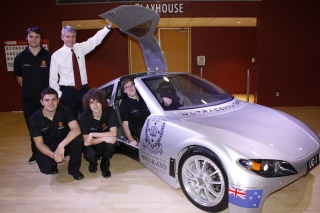Waikato electric car to race the length of Australia
 PIC CAP: Waikato engineering students and their supervisor following the big reveal of their electric car: Clockwise from back left, Sam Berkers, Dr Mike Duke Luke Overton (in car), Sam Waetford and Kyle van de Pas.
PIC CAP: Waikato engineering students and their supervisor following the big reveal of their electric car: Clockwise from back left, Sam Berkers, Dr Mike Duke Luke Overton (in car), Sam Waetford and Kyle van de Pas.
A group of University of Waikato mechanical engineering students have unveiled their masterpiece – an electric car they will race 3000km from Darwin to Adelaide over six days next month.
The team has been working on the refurbishment of the car for the last six months in preparation for the 2013 Bridgestone World Solar Challenge which begins in Darwin on 6 October.
The UltraCommuter car was unveiled at an exclusive event at the UniversityÕs Gallagher Academy of Performing Arts, before its trans-Tasman journey to Darwin, ahead of the team.
The University’s electric car was built in 2007. Its latest refurbishment has included reformatting of the suspension system and upgrading control systems, brakes and the body shell.
About 44 teams from 25 countries are signed up to compete in this year’s challenge, the world’s largest solar electric vehicle event which began in the 1980’s.
A total of eight University staff and students are heading to Darwin for the race, including the four key engineering students, Sam Berkers, Luke Overton, Sam Waetford and Kyle van de Pas and their supervisor, Senior Engineering Lecturer Dr Mike Duke.
The biennial event attracts international teams from universities, technical institutes and private entrepreneurs that compete in three main classes: Challenger, Cruiser and Adventure.
This year the University car has been invited by the WSC organisers to pioneer the new EVolution (EV for electric vehicle) class aimed at demonstrating practical and low environmental impact vehicles. As well as pioneering the EVolution Class, it will be the only New Zealand car in the event.
“It’s a pilot to see if EVolution class vehicles can complete the route in six days and also gauge interest in the new Class from other teams,” says Mike.
Mike says the plan is to travel the 3000kms over six days at highway speeds of 90kmh or more. The car has a range of 350-400kms on a single charge and can boost-charge in between main charges.
The World Solar Challenge fosters innovation in technology and design, and promotes alternatives to conventional vehicle engines that often lead to the development of products that end up on the production line.



